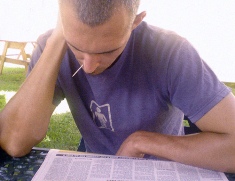According to an article in The Harvard Crimson, some students are embracing Deaf culture more at Harvard University, while students ask for ASL courses for full inclusion.
The subject of the Harvard article, Westley “West” A. Resendes, has had some good experiences at Harvard as a student who wears a cochlear implant and self-identifies as culturally “Deaf.”
According to the article, “He had interpreters for lectures, sections, and thesis meetings, as well as outside events at the Kennedy School of Government and Kirkland House.”

The university provides full inclusion during access. For example, Resendes recalls that when Family Guy creator, Seth McFarlane, visited Harvard, the celebrity learned signs for vulgar words in ASL and then said them and watched the interpreters sign them, according to the article.
Times have changed for students who are deaf at Harvard. A professor from the deaf college Gallaudet University, Caroline M. Solomon, said there were no staff interpreters when she arrived at Harvard.
According to the article, “Halfway through [Solomon’s] first semester, however, the school hired an interpreter full time, who stayed with her for the next four years.”
Resendes and others sometimes don’t receive interpreters if they can’t give advance notice, according to the article.
Sarah D. Gluck, a deaf graduate student pursuing a degree in speech and hearing bioscience and technology, said, “Hearing students have the privilege of walking through the hallway and seeing a poster for something, like a science lecture or talk that’s happening that day or later that week, but it’s hard for me to have any sort of spontaneity.”
Gluck and others who are deaf must give two to three weeks’ notice of their intentions to attend an event, according to the article.

Besides the difficulties of interpreter availability at Harvard, the lack of American Sign Language, or ASL, classes thwarts students like Resendes. The university had ASL courses in the 1990’s, but dropped them due to funding. Now, according to the article, the only ASL courses are provided by the campus organization CODA.
According to the article, Resendes tried fulfill his Harvard foreign language requirement with ASL and his request was denied. Currently, Harvard students can study ASL only as a source of research.
Resendes said, according to the article, that the standard is “rather unfair…considering other languages can be taken for pleasure at Harvard,” and that “The University needs to reconsider its outdated position on ASL.”
Significant strides are being taken by the university journalism staff because they are providing balanced news by presenting news from the perspective of deaf students. Also, The Harvard Crimson reporters aren’t perpetuating stereotypes and are including issues relevant to students with all abilities.

Media inclusion is crucial for the future inclusive environment at Harvard, because without news coverage, students and faculty at the campus wouldn’t know the issues faced and changes needed.
According to Susan C. Levine in “Reporting on Disability,” “Media coverage plays a crucial role in educating the public on disability issues. It could–and should–be helping people understand that these are civil-rights issues. But more often than not, reporting on disability perpetuates negative stereotypes or fails to tell the story from the perspective of people with disabilities.”

Like many universities, Harvard is working toward greater access and inclusion for all students and the article in The Harvard Crimson is proof that the campus culture encourages growth.
If you would like to provide a more inclusive environment for people who are Deaf, Hard of Hearing, or Deafblind, you can request services from Sign Shares here or call 713.869.4373 or 866.787.4154.

